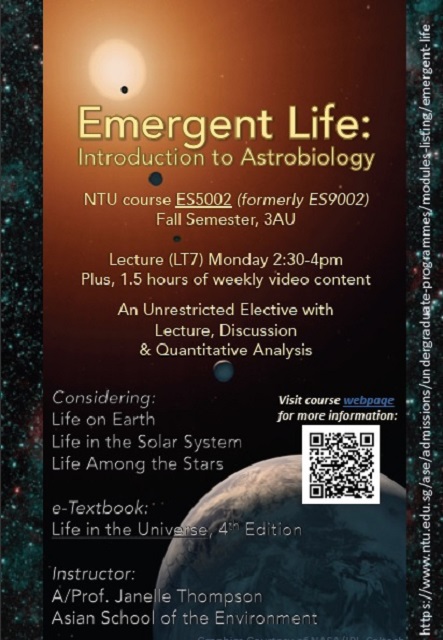ES5002: Emergent Life - Introduction to Astrobiology
Course Aims
This course will provide an introduction to the search for Life in our solar system and beyond, and how biological processes shape the environment of Earth, and possibly of other worlds. You will consider the various interpretations of what it means to be “alive”, the known factors that limit habitability on our modern world and the diversity of organisms that have adapted to thrive across conditions, including in “extreme” environments such as hydrothermal vents, acid pools, and high deserts. You will also learn about how biology has played a role in shaping earth’s environment in the geological past and in modern times. You will learn about the search for life on other worlds, creation of new lifeforms through synthetic biology, and the interplay of scientific and cultural theories on the origin of life from abiotic conditions (i.e. abiogenesis). You will also carry out group-based projects in concert with the second half of the course, to investigate trajectories of non-human life in the solar system, within the context of earth’s geologic past, current scientific and technological advances, sustainability under scenarios of global change, and socio-cultural considerations. This multidisciplinary course contributes to the NTU mission to provide education “…founded on science and technology, nurturing leaders through research and a broad education in diverse disciplines.”

Intended Learning Outcomes
By the end of this course, you (as a student) would be able to:
- Articulately describe the modalities of life expected to occur in different environments on earth and across the solar system. (LO1)
- Identify the major resources required to support carbon-based life. (LO2)
- Describe the impact of biological processes on planetary scale features such as atmosphere and ocean composition (LO3).
- Critically discuss topics in popular science (e.g. astrobiology and synthetic biology) within the context of their recent scientific advances, potential future developments, and socio-cultural considerations. (LO4)
Course Content
- Emergence and early life on earth,
- Factors governing the habitability of planetary bodies,
- Application of the scientific method to the search for life in the Universe. Course readings and discussions will include knowledge and theory as well as socio-cultural perspectives.

